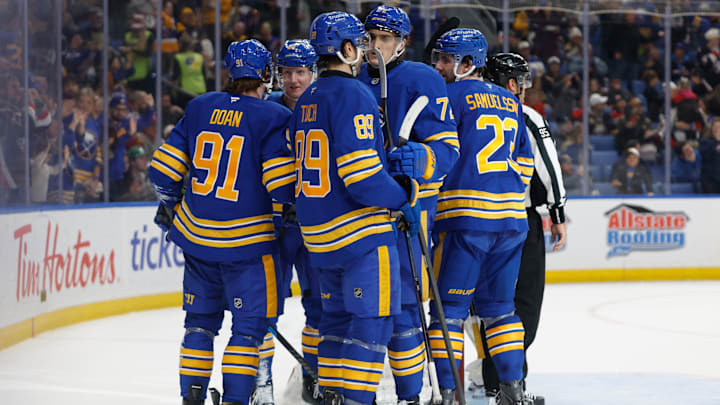Buffalo Sabres general manager Kevyn Adams should already be preparing to make a blockbuster deal involving star winger Alex Tuch ahead of the 2026 NHL trade deadline in March because the sides remain locked in a stalemate regarding a potential contract extension.
Nick Kypreos of Sportsnet reported Tuch and the Sabres remain nowhere close to an agreement on a contract to keep the 29-year-old Syracuse native in Western New York.
"Also, with so many of next summer's UFAs off the board, Tuch may be waiting and in position to become a premier UFA in July," Kypreos wrote. "Right now, the two sides are far apart in cash. Do the Sabres see Tuch, currently tied for the team scoring lead, as a $10 million player?"
It's the same question that's been asked since the summer and the complete lack of progress in negotiations strongly suggests the answer is no, which means Buffalo will likely have little choice beyond trading Tuch to the highest bidder in a few months.
The Buffalo Sabres must begin laying the groundwork for an Alex Tuch trade by taking one key step
Brian Bartlett, Tuch's agent, explained in October that he's "had some good conversations" with the Sabres about an extension for the Team USA Olympic roster hopeful. Those didn't yield a pen being put to paper, however, and another statement raised concern.
"We weren't able to kind of get to what made a deal before the season," Bartlett told Irfaan Gaffar and David Pagnotta of The Fourth Period. "And then at this point, we've just put it on the back burner."
Putting something on the "back burner" when there's only a couple months for the Sabres to make a final decision is far from ideal.
In turn, Adams should be on the phone with Bartlett in the near future to chart a path in one of two divergent directions:
- Work tirelessly to figure out if there's enough common ground to get an extension done, and finalize it before the NHL's break for the 2026 Winter Olympics in February.
- Agree a new contract isn't possible and allow Bartlett to begin (quietly) discussing extension possibilities with teams interested in Tuch via trade.
At this point, the latter option appears far more likely and it would give Buffalo the best chance to maximize the potential trade return.
Opposing front offices understand the Sabres' situation. As a team that's not a major player for the NHL's top trade or free-agent targets, it can't afford to let Tuch walk into unrestricted free agency at season's end without getting anything in return. That reality hurts the front office's leverage.
The only way to mitigate that is giving Tuch's camp a chance to seek out that massive long-term contract extension from another team before a trade is made. Another front office will give up more assets if it knows the terrific two-way winger is staying for the long haul.
It's no guarantee the plan will work, of course. Tuch is quickly becoming one of the top remaining potential UFAs available next summer, so he may decide his best option is simply hitting the open market with hope a bidding war will drive up the final price.
That said, the Sabres are running out of options and time. It's the only route remaining that could allow Adams to receive anywhere close to fair-market value for the 2014 first-round draft pick.
Buffalo sports fans will continue to hold out hope Tuch's hard-line stance on his contract demands softens enough to keep him in the 716.
It doesn't appear that's going to happen, however, which puts the organization's general manager on the clock to find a trade.
